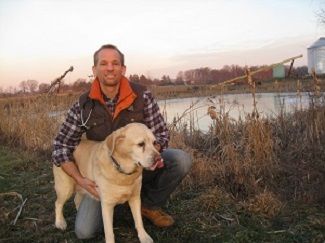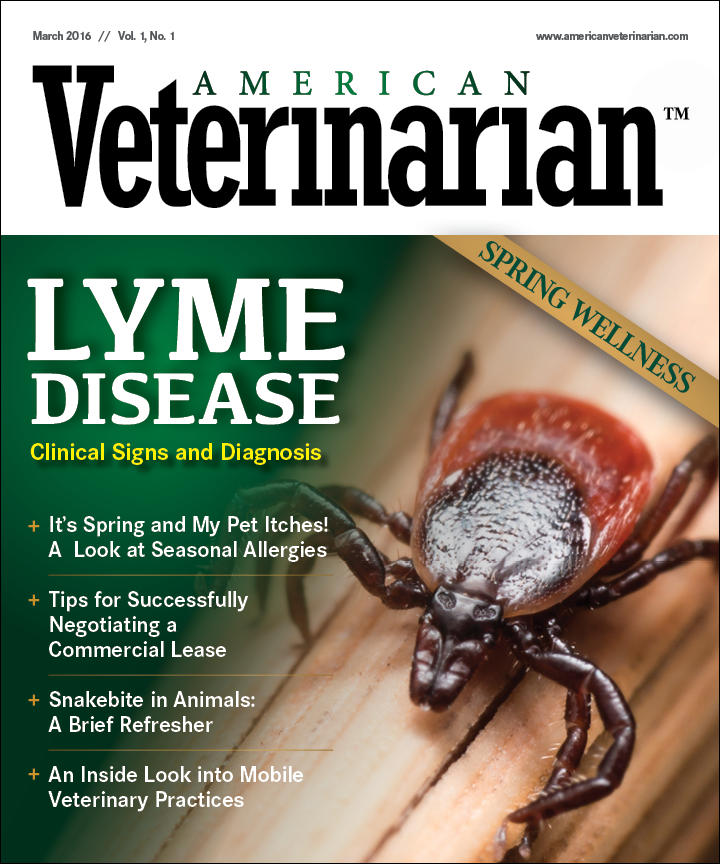An Inside Look into Mobile Veterinary Practices
To learn more about mobile veterinary practices, American Veterinarian interviewed Carmine Esposito, DVM, founder and owner of Progressive Mobile Veterinary Services, located in Clinton, New Jersey.
With an estimated 26,000 veterinary practices in the United States in 2014,1 the veterinarian industry is growing and mobile veterinary practices are on the rise. Although house calls are certainly nothing new to veterinary medicine, utilizing a mobile veterinary practice for more than large animals and livestock is a new direction and one that some veterinarians may want to consider. To learn more about mobile veterinary practices, American Veterinarian interviewed Carmine Esposito, DVM, founder and owner of Progressive Mobile Veterinary Services, located in Clinton, New Jersey.
Q: Why did you pursue a career in veterinary medicine?
A: Like most veterinarians, it was a calling first recognized as a childhood dream. I always had a passion for nature, science, and animals. I remember reading James Herriot’s All Creatures Great and Small. The stories of a country veterinarian resonated with my passion for animals and my rural upbringing. These stories made me dream of one day being a country veterinarian. As it would come to pass, I pursued pharmacy instead of veterinary medicine; however, after working 7 years as a pharmacist, I finally decided to follow my calling.
I am reminded every day of why I wanted to become a veterinarian. I knew that pharmacy was not the field for me when I felt burdened with monotony, boredom, and the lack of patient appreciation for my efforts to help them feel better. Veterinary medicine, however, is the complete opposite. As most veterinarians know, unlike our human counterparts who care for one species, veterinarians must help and heal multiple species of animals, and aside from helping all of these different species, veterinarians are expected to wear many hats: as the general practitioner, surgeon, pharmacist, dentist, cardiologist, dermatologist, husbandry consultant, public health consultant, etc. The list of roles the veterinarian must assume is almost endless. I find this to be an exceptionally rewarding experience, and this inherent diversity of patients, procedures, and clients energizes me every day. The appreciation I see in my patients’ eyes when I help them feel better and their human parents’ gratitude is the proverbial icing on the cake. I am honored to be the “other” family doctor.
Q: What prompted you to start a mobile veterinary practice?
A: There are many reasons I decided to become a mobile veterinarian, but ultimately, it was because I wanted a better experience for my patients, clients, and myself. The more traditional practices I worked at prior to going mobile were busy, hectic, loud, and often inconvenient for the pet owners. Appointments were scheduled every 15 to 20 minutes. This relatively short appointment time made it difficult to develop a great connection with my patients and their owner. Due to scheduling constraints, I often saw sick patients several days or weeks after their owner had noticed the illness. I also observed patients so nervous from the car ride and/or the office that they would vomit, have diarrhea, or bite people due to fear. As I witnessed these scenarios repeat themselves, I thought there must be a better option.
I researched many options and learned that the permits, zoning, time, and cost involved in opening another veterinary office would handcuff me to the same impersonal and anxiety-inducing appointments that I wanted to avoid. Ultimately, the desire to be the other family doctor who helps and heals in the comfort of your home appealed to me. Across my professions, first as a pharmacist and now as a veterinarian, I always desired a connection with my patients. Going to the patient’s home allows me the opportunity to make that connection and the visit is much more enjoyable for everyone involved. Appointments are typically 45 minutes with minimal stress on patient and owner.
My typical house call can involve many services, such as wellness exams, vaccinations, sick pet exams, deworming, microchipping, ophthalmic exams with glaucoma testing, tear production test, corneal ulcer testing, abdominal ultrasounds, electrocardiogram, echocardiograms, blood pressure screenings, diagnostic laboratory testing (bloodwork, fine needle aspirates, biopsies, skin scrapes, etc), pharmacy services, electronic medical records, health certificates, hospice care, euthanasia, and cremation services. In addition to these services, many mobile veterinarians decide to purchase full-service “hospitals” on wheels. These mobile hospitals would allow for additional services such as x-rays, surgery, and dental procedures. The average cost for a full-service hospital on wheels is $225,000. Currently, I refer my patients requiring x-rays, surgery, and dental procedures to local veterinary offices and in return, many of these local offices refer their clients requiring a house call to my mobile practice. My goal is to purchase a full-service hospital on wheels in the near future.
I have found the mobile practice to be especially helpful for:
- The elderly or clients with disabilities
- Multiple pet owners: No need to load all the cats and dogs in the car at the same time No need to make multiple appointments and trips to the vet’s office for all the pets
- Busy families: I work around the owners schedule No need to get a sitter for the kids or take time off of work to get to the vet
- Pet owners with transportation issues: Large dog and small car Birds and reptile transportation during cold weather Cats unable to be placed in carrier or car Unable to lift animal into car Breeders or clients with young or immunocompromised patients Provides an opportunity to minimize these patients exposure to potential infectious diseases
Q: What challenges do you face as a mobile veterinarian?
A: By far, the biggest challenge I face is the amount of time spent driving and the resulting inefficiency from being on the road most of the time. This time is unproductive and often translates into very long days where I can only see a few clients. Most days are scheduled for 5 to 6 appointments knowing that an unexpected appointment or two will pop up. The typical day is 7 to 8 appointments, which requires approximately 10 hours on the road followed by 3 to 4 hours of paper work once home. For every hour I spend with a client, there is at least 30 minutes of paper work to be completed at the end of the day. To help overcome this challenge, I have hired staff to work remotely on scheduling, billing, ordering supplies, and updating the patient’s electronic medical records.
There is an additional challenge of finding clients that are willing to pay a little more for this individualized convenient attention. While most clients recognize the convenience of the mobile service, they do not realize the time and cost associated with such a service. The gas, wear and tear on the vehicle, lack of ability to see 30 patients a day (as a traditional practice can do), etc, all add up. I have embraced this lack of understanding as an opportunity to educate my clients. Each one of my appointments requires approximately 2 hours of time (including driving, time at the patient’s home, and paperwork). This amount of time is about 6 times the time allotted at a veterinary office. The average cost of the house call is $50 more than a comparable office visit. My clients and I feel this is a bargain for the more personable, convenient, and less stressful house call. Not everyone who contacts the mobile practice feels this way, however, and so educating clients on all that goes into the mobile veterinary service is the key.
Another big challenge I face is finding a balance between work and personal life. A mobile veterinary practice is designed to be convenient for clients and, therefore, I am always extremely busy at times when my clients are available, such as nights, weekends, and very early mornings.

Q: What advice do you have for anyone considering starting a mobile veterinary practice?
A: Starting a mobile veterinary practice has been the best decision I have made. It builds the type of relationships with your patients and clients that you could only dream of in an office environment. There are challenges which must be considered before jumping in though: you must love being on the road and you have to be accepting of the long hours that are not convenient for you, but convenient for your clients. If you already have a practice, you should consider your current patients and clients and whether or not they will continue to utilize your services as a mobile veterinarian. Would they be willing to pay the additional cost of a visit?
If you think this is the type of practice for you, I also suggest reaching out to a local mobile veterinarian and asking to ride along for a few days. In addition, I recommend getting involved in the mobile/house call associations. You should also think about the type of services you would like to offer. Is your geographic area a good market for these types of mobile services? There are many services you can provide with basic equipment; however, x-ray, surgery, and dental procedures will require a more substantial investment in equipment. Mobile truck vendors, such as Laboit Specialty Vehicles Inc, have been a tremendous resource.
Q: What are your hopes for the future of veterinary medicine?
A: I currently see a huge disparity between the level of medical care pet owners want for their pets and the level they can afford. This is not anyone’s fault, but a sign of the changing attitude people have about pets. Pets are now seen as family members and, as such, owners expect that they will receive the same medical care a child or an aging parent would receive. Veterinarians are trained to provide this level of care and have the desire to do so, but often pet owners decline the service because of inability to afford the cost. The cost is due to the price of equipment and cost of education required to perform these procedures and tests. I hope that someday soon, veterinarians can effectively educate clients on the cost of such procedures and work with clients to develop a medical system that will provide the client with the means to reimburse veterinarians for their expertise and training, and pay for required equipment to allow all of our 4-legged, feathered, and scaled family members access to the best possible health care.
Dr. Carmine Esposito, DVM, PharmD is the founder and owner of Progressive Mobile Veterinary Services, located in Clinton, NJ. Dr. Esposito earned his Doctorate in Pharmacy from the University of the Sciences in Philadelphia. Dr. Esposito practiced pharmacy for seven years before pursuing his dream of becoming a veterinarian. In 2010, he graduated Magna Cum Laude from St. George’s University School of Veterinary Medicine after completing his clinical year at North Carolina State University Teaching Hospital. His vast knowledge of pharmacology and physiology, in both veterinary and human medicine, allows him to easily explain and discuss diseases and treatments with pet owners. He strives to provide pet owners with a better understanding of their pets’ medical conditions.
References
- Downing J. Veterinary private-practice sector makes modest rebound. Veterinary Information News website. http://news.vin.com/doc/?id=6288910. Published May 13, 2014. Accessed January 13, 2016.
